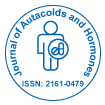Make the best use of Scientific Research and information from our 700+ peer reviewed, Open Access Journals that operates with the help of 50,000+ Editorial Board Members and esteemed reviewers and 1000+ Scientific associations in Medical, Clinical, Pharmaceutical, Engineering, Technology and Management Fields.
Meet Inspiring Speakers and Experts at our 3000+ Global Conferenceseries Events with over 600+ Conferences, 1200+ Symposiums and 1200+ Workshops on Medical, Pharma, Engineering, Science, Technology and Business
Editorial Open Access
Food and Inflammation: Role of Nutrition in Metabolic Syndrome, Diabetes and Cardiovascular Disease and The Complexity of The Search for A Culprit
| Christoph Hotz-Behofsits* | ||
| Scientist, NanIRx Therapeutics, New York City, USA | ||
| Corresponding Author : | Christoph Hotz-Behofsits Scientist, NanIRx Therapeutics, New York City, USA E-mail: CMHotz@hotmail.com |
|
| Received December 20, 2010; Accepted December 24, 2011; Published December 25, 2011 | ||
| Citation: Hotz-Behofsits C (2011) Food and Inflammation: Role of Nutrition in Metabolic Syndrome, Diabetes and Cardiovascular Disease and The Complexity of The Search for A Culprit. Autacoids 1:e104. doi: 10.4172/2161-0479.1000e104 | ||
| Copyright: © 2011 Hotz-Behofsits C. This is an open-access article distributed under the terms of the Creative Commons Attribution License, which permits unrestricted use, distribution, and reproduction in any medium, provided the original author and source are credited. | ||
Related article at Pubmed Pubmed  Scholar Google Scholar Google |
||
Visit for more related articles at Journal of Autacoids and Hormones
| Pinning down the effects of individual foods in a varied diet is intrinsically difficult. The interaction of ingredients, cooking methods, other lifestyle factors and genetics leads to outcomes that are notoriously challenging to interpret. The macronutrients fat and carbohydrate and the mineral sodium have been blamed for obesity, type 2 diabetes and high blood pressure, all risk factors for cardiovascular disease, the number one cause of death in developed countries. Conversely, many nutritional studies have contradictory outcomes. Study design, especially a carefully chosen control group, is paramount, as the following studies show. | |
| Protein: Milk versus Soy: A recent study supported by the National Dairy Council [1] indicated a reduction of oxidative and inflammatory stress (including IL-6) in volunteers with metabolic syndrome given dairy containing about 30 g protein and 1000 mg calcium daily for 3 months. Controls could choose among dairy-free foods with similar protein content, including soy, meat and peanut products, but none contained more than 150 mg calcium per daily serving. The study does not suggest whether the calcium content or other factors caused the health benefits. | |
| Nearly a reverse order of investigated food and accompanying control could be seen in another study [2] which compared the effects of 20 g soy protein per day on post-menopausal women with casein, a milk protein. Inflammation (IL-6) and body fat were both slightly reduced after 3 months in the soy protein group. | |
| Fat: Fish, Olive Oil or Industrial Trans Fatty Acids: A longitudinal cohort study [3] was used to analyze the impact of diet on endothelial dysfunction and inflammation (including IL-6 and TNFα) over a 6-year period in healthy adults. Fish consumption correlated with reduced markers for endothelial dysfunction and inflammation due to w-3 polyunsaturated fatty acids. Fruit, vegetable, dairy and alcohol consumption showed no effect. No other dietary factors were considered, thus ignoring the potential impact of any other source of fatty acids besides fish like meat or olive oil, or other variables like consumption of sugar, dietary fibers or sodium. The fatty acid composition of meat is highly dependent on animal feed [4] and rarely taken into account in nutritional studies. | |
| With all the advances of the last decades in the research of the nutritional aspects of inflammation and its role in cardiovascular disease, many more questions are waiting to be answered. The Journal of Autacoids is ready to do its part, its open access policy and special features like audio conversion and language translator are particularly suited to develop a large readership. | |
| References | |
|
|
Post your comment
Relevant Topics
Recommended Journals
Article Tools
Article Usage
- Total views: 13189
- [From(publication date):
January-2011 - Nov 24, 2025] - Breakdown by view type
- HTML page views : 8583
- PDF downloads : 4606
